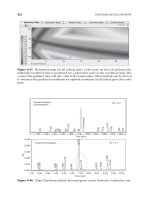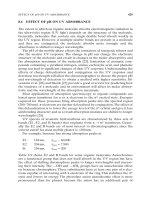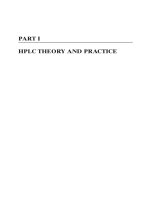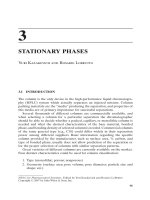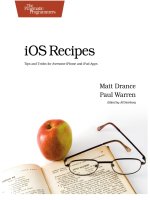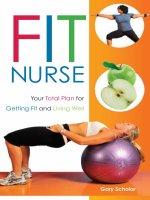Advance Praise for Fit Nurse: Your Total Plan for Getting Fit and Living Well docx
Bạn đang xem bản rút gọn của tài liệu. Xem và tải ngay bản đầy đủ của tài liệu tại đây (5.48 MB, 266 trang )
FIT NURSE
Scholar
N
urses make a major difference in the lives of their patients, but sometimes
they sacrice their individual health and tness goals for their work. Do you?
Do you grab fast food once, twice, even four or ve times a week? Are you
caught in the sleep-deprivation trap? Do you plan to hit the gym, but then
skip your workout because you’re exhausted or out of time? Do you urge
your patients to eat well, sleep well, and exercise every day, yet seldom do
so yourself?
You’re not alone! Fit Nurse will empower and inspire you to make a difference
in your own life with
•
Comprehensive wellness plans that work with your demanding
schedule.
•
Practical tips for improving the quality of your life.
•
Inspiration for reaching your goals.
•
Methods for increasing your energy level.
•
Proven professional advice on nutrition, tness, and weight
management, —from someone who has been helping nurses
restore their health for more than 10 years.
So kick off your shoes, relax, have fun, and become a Fit Nurse!
GARY SCHOLAR, M.ED, is a nationally recognized health and well-
ness expert who spent 10 years as a consultant to the employees
of the American Hospital Association. A teacher, researcher, and
writer, he contributes to Voice of Nursing Leadership (from the American Orga-
nization of Nurse Executives) and American Nurse Today.
Your Total Plan for
Getting Fit and Living Well
FIT
NURSE
Your Total Plan for
Getting Fit and Living Well
Gary Scholar
www.nursingknowledge.org/STTIbooks/
$24.95 USD
Fit Nurse Cover.indd 1 12/18/09 6:21:00 PM
Job Name:95396
PDF Page:95396pbc.p1.pdf
Color:
Date:09-12-21
Cyan Magenta Yellow Black
Advance Praise for
Fit Nurse: Your Total Plan for Getting Fit
and Living Well
“Fit Nurse: Your Total Plan for Getting Fit and Living Well is an interactive book that
encourages healthcare professionals to design and own their personal plan of care.
Reading about similar experiences from others in my profession allowed me to be
honest with my own lifestyle assessment. I applaud Gary Scholar. He is a true advo-
cate for the health and wellness of nurses.”
–Cathy Clark, RN
Night Shift Liaison
AtlantiCare Regional Medical Center
Pomona, New Jersey
“As caregivers, nurses are keenly aware of healthy versus unhealthy lifestyles, but
often find it difficult to incorporate these strategies into their own hectic lives. Fit
Nurse: Your Total Plan for Getting Fit and Living Well clearly identifies the challenges
nurses face and offers the encouragement, inspiration, and support to incorporate
these healthy choices into your lifestyle. This book takes the work out of doing
what you know you need to do for yourself, but might not know how to get started.
There’s even a chapter dedicated to the specific needs of working the night shift. The
interactive style of the book plugs you right into the content, so keep a notepad and
pen handy (or write notes in your book) . . . and you are on your way! Do this for
you. You deserve it!
–Eileen Gallen Bademan, RN, BSN
Staff Nurse
St. Mary Medical Center
Langhorne, Pennsylvania
Author of A Daybook for Critical Care Nurses
Gary Scholar, M.Ed.
FIT
NURSE
Your Total Plan for
Getting Fit and Living Well
Sigma Theta Tau International
Copyright © 2010 by Sigma Theta Tau International
All rights reserved. This book is protected by copyright. No part of it may be
reproduced, stored in a retrieval system, or transmitted in any form or by any means,
electronic, mechanical, photocopying, recording, or otherwise, without written
permission from the publisher.
Any trademarks, service marks, design rights, or similar rights that are mentioned, used,
or cited in this book are the property of their respective owners. Their use here does not
imply that you may use them for similar or any other purpose.
Sigma Theta Tau International
550 West North Street
Indianapolis, IN 46202
To order additional books, buy in bulk, or order for corporate use, contact Nursing
Knowledge International at 888.NKI.4YOU (888.654.4968/US and Canada) or
+1.317.634.8171 (outside US and Canada).
To request a review copy for course adoption, e-mail
or call 888.NKI.4YOU (888.654.4968/US and Canada) or +1.317.917.4983 (outside
US and Canada).
To request author information, or for speaker or other media requests, contact Rachael
McLaughlin of the Honor Society of Nursing, Sigma Theta Tau International at
888.634.7575 (US and Canada) or +1.317.634.8171 (outside US and Canada).
ISBN-13: 978-1-930538-94-8
Library of Congress Cataloging-in-Publication Data
Scholar, Gary, 1955-
Fit nurse : your total plan for getting fit and living well / Gary Scholar.
p. ; cm.
Includes bibliographical references.
ISBN 978-1-930538-94-8
1. Nurses Health and hygiene. 2. Physical fitness. I. Sigma Theta Tau International.
II. Title.
[DNLM: 1. Nurses. 2. Physical Fitness. QT 255 S368f 2010]
RT67.S36 2010
610.73 dc22
2009048674
First Printing, 2010
Publisher: Renee Wilmeth
Acquisitions Editor: Cynthia Saver,
RN, MS
Editorial Coordinator: Paula Jeffers
Cover Designer: Rebecca Batchelor
Interior Design and Page Composition:
Rebecca Batchelor
Principal Editor: Carla Hall
Copy Editor: Kevin Kent
Proofreader: Billy Fields
Indexer: Johnna VanHoose Dinse
Illustrator: Rebecca Batchelor
Dedication
This book is dedicated to my mom, Rita Scholar, who always wanted to be a nurse,
but life circumstances led her down a different path. Still, she realized part of
her dream by volunteering at a hospital for 15 years.
To my dad, Edward Scholar, and my mom who constantly encouraged me
in my writing.
To nurse executive Karen Hendrickson of Southeast Missouri Hospital, who inspired
me with her commitment of self-care for a healthier lifestyle.
To all nurses, who are inspirational, compassionate heroes.
Cover photo credits: (Back, from L-R: photo 1 and author photo by Kaiti Green of James Photo Studio,
Chicago, Illinois; photo 2 from istockphoto.com; photo 3 by Jane Palmer, Sigma Theta Tau International,
Indianapolis, Indiana. Front top by Kaiti Green of James Photo Studio, Chicago, Illinois; middle from
istockphoto.com; bottom by Kaiti Green of James Photo Studio, Chicago, Illinois.)
Acknowledgements
This book would not have been possible without the support, encouragement,
and inspiration from so many people. I want to express my special thanks to the
following people:
Raina Childers, RD, director of Health Point Fitness
Roseann Kobialka, director of organizational development, AtlantiCare
Robyn Begley, DNP, RN, CNEA-BC, vice president of nursing/CNO,
AtlantiCare
Cathy Clark, RN, night shift liaison, AtlantiCare Regional Medical Center
All the amazing nurses at AtlantiCare
All the nurses who so willingly shared their stories for this book
Karen Hendrickson, nurse executive at Southeast Missouri Hospital, Cape
Girardeau, Missouri
Caroline Jung
Karen Redmond
Mona Wu
Rhonda Fentry
Kaiti Green, photographer, James Photo Studio
Grace Walker (the meditating RN in scrubs on the back cover) and Kelly
Sego of Clarian Health, Indianapolis, Indiana
Rebecca Batchelor for her exceptional cover and text design
Carla Hall and all the wonderful staff at the Honor Society of Nursing,
Sigma Theta Tau International
Very special thanks to Cindy Saver, who believed in me and was always posi-
tive and encouraging in guiding me through the publishing process
And to my dog, Sadie, and my cat, Binky, who lay next to my computer to
keep me company during the many hours of writing the book.
Points of Passion Author Notes
While participating in self-care and wellness programs is extremely important
to maximize your own health potential, nurses understand better than most
people the often-random devastation of disease. A groundbreaking initiative,
The American Center for Cures, headed by Richard Boxer, MD, and Lou Weis-
bach, may help change the frustrating, devastating cycle of suffering. To learn
more about this initiative, please visit www.theamericancenterforcures.org.
In honor of his mother, a lifelong, passionate knitter, Gary Scholar has
published a self empowerment picture book for children titled Angora: I’m
Knot Just Fluff, I’m Always Enough. As a result of the book, he has created a
self empowerment knitting and crocheting initiative for “tween” (8-12 year
olds) and teens called “Cast On To Your Dreams.” This initiative will be rolled
out nationwide by the end of 2010. Besides learning how to knit or crochet,
the “Dream Stitchers,” as participants are called, will keep journals about their
commitment to their dreams, their acts of kindness, and their acceptance of
others. One of the objectives of the program is to teach knitting or crocheting
to hospitalized children, who may lay in bed for weeks or months at a time,
with little constructive to do. This self-empowerment initiative will give sick
children something wonderful to occupy their minds, keep their spirits up, and
instill pride in their accomplishments.
About the Author
Gary Scholar, M.Ed., is a nationally recognized health and wellness consultant.
He spent 10 years as a health and wellness consultant for the employees of
the American Hospital Association. He formerly taught at the Department of
Health and Research Policy at the University of Illinois, Chicago, on a Nation-
al Institutes of Health grant, working to lower the severity of multiple chronic
illnesses through fitness and health education. He has also contributed numer-
ous wellness articles to the nurse executive magazine Voice of Nursing Leadership
and to American Nurse Today, the official magazine of the American Nurses
Association.
Scholar’s mission is to be an advocate for nurses and to lead a national call-
to-action campaign that benefits the health, wellness, and self-care of nurses
everywhere. His immediate goals are to work with hospitals, nursing schools,
and communities to create nurse wellness programs, and to initiate a series of
wellness awards ceremonies that specifically honor nurses who create healthier
lifestyles for themselves. He is available for employee health and wellness
consulting, speaking engagements, and book signings. Contact Gary Scholar
directly at
Contributing Authors
Karen Redmond
Karen Redmond, MS, is a CHEK-certified CHEK faculty, corrective exercise
specialist, and holistic health and lifestyle coach. She has a master’s in science in
health and fitness promotion and is a master CHEK practitioner and instruc-
tor. Karen is the owner of North Shore Smart Bodies in Northbrook, Illinois.
She specializes in corrective exercises and holistic lifestyle coaching. She sees a
wide variety of clients, including those with orthopedic injuries and back pain.
She also works with pre- and post-natal clients and athletes.
Caroline Jung
Caroline Jung, LAc, MSOM, received her undergraduate degree in psychology
from the University of Memphis and her master’s of science in Oriental medi-
cine from Midwest College of Oriental Medicine. She is a nationally board
certified acupuncturist. Jung was part of a pilot program that provided acu-
puncture and massage for nurses at Children’s Memorial Hospital, Chicago Il-
linois. Jung has been featured in numerous publications including the American
Organization of Nurse Executives’ journal, Voice of Nursing Leadership. Caroline
has a special emphasis on treating women’s health, digestive disorders, skin dis-
orders, and pain management. She is also a certified yoga teacher.
Raina Childers
Raina Childers, RD, is director of Nutrition Services at Health Point Fitness, a
medically integrated fitness center in Cape Girardeau, Missouri. She is a regu-
lar on-air face for the CBS affiliate, KFVS 12 (serving southern Illinois, eastern
Missouri, western Kentucky, and parts of Tennessee and Arkansas), where she
has her own segment called “Cooking With Raina” on the Emmy award win-
ning morning show.
Table of Contents
1 ICU (Inspired Care for yoU):
Starting Your New Lifestyle Shift . . . . . . . . . . . . . . . . . . .1
2 Assess Yourself: Giving Yourself the Same
Honest Assessment You Would Any Patient 13
3 Take Charge, Nurse: Assertiveness Training
for Your Life 19
4 Vital Metabolism: It’s Not Just About Waist Sizes 31
5 In Control: Managing Blood Pressure, Cholesterol,
and Blood Sugar . . . . . . . . . . . . . . . . . . . . . . . . . . . . . .37
6 How ER (Exercising Regularly) Can Help Keep
You Out of the ED (Emergency Department) 47
7 Taking Back Your Back: Reducing or Eliminating
Back Pain Through Fitness . . . . . . . . . . . . . . . . . . . . . .79
8 Getting Out of Your Comfort Zone:
Recognizing the Signs and Changing the
Behaviors of Comfort Eating . . . . . . . . . . . . . . . . . . .103
9 Nourish Yourself, Nurse: Nutrition That Fits
Your Life . . . . . . . . . . . . . . . . . . . . . . . . . . . . . . . . . . . .119
10 When the Night Shift Eclipses You:
Special Strategies for Night-Shift Nurses . . . . . . . . . .135
11 Weighing Your Options: Weight Management
for Every Nurse 147
12 Holistic Health and Nutrition From Traditional
Chinese Medicine 163
13 Developing Your Own Life-Support Team . . . . . . . .175
A Personalizing Your Assertive Nurse
Daily Care Plan . . . . . . . . . . . . . . . . . . . . . . . . . . . . . .185
B Staging Your Own Food Shopping Intervention:
Strategies for Navigating Those Dangerous Aisles .193
C Recipe RX for RNs . . . . . . . . . . . . . . . . . . . . . . . . . . . .205
References 237
Index 241
Foreword
When I was asked to write a foreword to this book, I was indeed honored, be-
cause the topic of fitness in the nursing industry is a great passion of mine. The
nursing profession is one of the most honorable professions and offers more
opportunities today than ever before. Among the plethora of careers, nursing is
a good and noble option; however, with every blessing, there lies a burden. The
responsibility, compassion, giving, kindness, and other foundations required for
proper patient care also flow into our personal lives and can result in long, tir-
ing days that may deplete our health and interfere with our own self-care.
Gary Scholar, a long-time fitness and wellness guru, became passionate
about the health of nurses after he began consulting for the American Hospi-
tal Association a number of years ago. What really bothered him, he reports,
was that he saw nurses routinely putting others’ needs ahead of their own—in
all aspects of their lives. While they were constant and effective advocates for
their patients, Scholar found it extremely challenging for nurses to convince
themselves to make their own needs a priority in their lives. Thus was born his
“Nurse Type E Personality” (where nurses do Everything for Everyone but
themselves) and his assertive nurse training philosophy.
Each chapter of Fit Nurse offers a different aspect of self-care for nurses to
consider. The book is full of instruction, solid science, and motivation and in-
spiration. It also embraces all characteristics of a nurse’s life, ranging from back
care to food shopping, and leaves no stone unturned, including metabolism,
energy, blood values, and night shift challenges. Further, a registered dietitian
contributes more than 35 recipes designed to make healthy eating tasty and
satisfying.
I will carry this book with me all day, every day, to access the tools Scholar
offers. This book, you see, will not weigh more than the baggage we all carry
on a daily basis—baggage that proceeds to wear us down, day after day, like a
dripping faucet that is never fixed. In my seminar “From Pressure to Peace,”
a stress management class designed for nurses, I teach participants the impor-
tance of balancing mind, body, soul, spirit, home, and work. In this course,
each nurse is required to complete a personal health care plan with the same
care, love, and devotion they give to each and every one of their patients. I have
witnessed how hard this exercise is for nurses to perform, but the teaching tools
found in this book walk the reader through the techniques so eloquently that
xiv FIT NURSE
anyone can do it. These step-by-step approaches for making changes disarm
the enabled nurse—those type E personality nurses—to be set free and restored
to the person that lies within.
I strongly suggest this book to everyone in the medical profession who is
passionately committed to shift work, demanding hours, and the loving com-
passion needed to sustain the fulfillment found in nurse work.
–Judith Henninger, RN, BS, CWC, HLC
Judith Henninger is a registered nurse, a certified corporate wellness coach, and a certified holis-
tic life coach. She works for AtlantiCare’s Health Engagement unit in southern New Jersey as a
health and wellness educator. AtlantiCare is a recipient of the 2009 Malcolm Baldrige National
Quality Award, and its medical center has been designated a nursing Magnet hospital by the
American Nurses Credentialing Center.
Introduction
When was the last time you did something really special just for you? If you’re
like a lot of nurses, the answer might be, “I can’t remember!”
I wrote Fit Nurse: Your Total Plan for Getting Fit and Living Well with the goal
of changing that answer to, “I do something special for myself every day !”
This book will help you rise above the many challenges and struggles you
face as a nurse when it comes to your own self-care, fitness, nutrition, weight
management, stress management, and well-being. It will provide you with the
tools, expertise, and inspiration to transform your lifestyle behaviors for the
better.
The inspiration for Fit Nurse came from my passionate belief that nurses de-
serve to be empowered to reconnect with themselves and align their minds and
bodies to create healthier lifestyles. The book also evolved from my many years
as a health and wellness consultant and passionate nurse advocate. I researched
and wrote articles about the disconnect between how much nurses give of
themselves to their profession and patients, and how underserved they are when
it comes to their own health and well-being.
My priority was to write an empowering wellness book specifically for nurs-
es; I wanted to integrate professional wellness expertise in all area’s of a nurse’s
life and give nurses a voice throughout the book as they talk about their own
experiences, challenges, and successes in implementing self-care and creating
healthier lifestyles.
The voices of nurses that speak throughout the book were gathered by many
interviews I’ve done with individual nurses across the country and by a survey
sent to hundreds of nurses at AtlantiCare Health System in New Jersey.
The five survey questions were
1. As a nurse, what are the challenges that have kept you from pursuing
personal self-care and healthier nutrition, regular fitness, or weight
management?
2. What do you think is the key trigger that would enable you, as a nurse,
to make a paradigm shift and become more proactive in your own self-
care and healthier lifestyle?
xvi FIT NURSE
3. Please explain in detail if you have had success in integrating personal
self-care and healthier nutrition, regular fitness, or weight manage-
ment into your daily life.
4. If you have had success, please write a 2-day food diary and fitness log
to show how you have integrated a healthier lifestyle within your hec-
tic, demanding work schedule.
5. Have you ever experienced chronic back pain? If so, how did you
treat it?
The book is meant to empower, inspire, and energize all nurses, including
hospital nurses, home health nurses, clinical nurses, nurse executives, or school
nurses, who struggle with their own self-care and want to shift toward a health-
ier lifestyle. It is also intended for nurses leading a healthier lifestyle who want
more practical knowledge and inspiration. It is especially aimed at students in
nursing schools. If you start living well while you’re in school, you have a great
foundation for continuing a healthier lifestyle by the time you become an RN.
If you are not a nurse but have a friend, co-worker, or family member who
is, this book represents the perfect gift for them—the gift of living well!
The book is important to nurses because it provides
• Specic,comprehensivewellnessplansthatcanbesuccessfullyinte-
grated on a daily basis, even with your demanding schedule.
• Inspirationonhowtoraisethequalityofyourlife.
• Professionalexpertiseinnumerousareasofyourlifestyle,including
nutrition, fitness, weight management, and back pain management.
• Theenergytobemoreeffectiveinyourjobasanurse.
My hope is that this book represents a bold call to action for all nurses. The
big-picture purpose of this book is to create a unified nursing movement with
the commitment to change the culture of nursing to place self-care high on the
priority list for effective nursing. Ideally, newly graduated nurses can enter a
profession that has nurses’ best interests at heart.
Thank you so much for the extraordinary opportunity to inspire you to im-
prove your quality of life as a nurse. The positive effects of this improvement
are that you are healthier and have more energy to take care of your patients.
xviiIntroduction
RX for Reading the Book
DOSAGE: Read the chapters during daytime or nighttime until completely
finished with the book.
REFILLS: You may read the book as many times as you would like, and you
may reorder the book for your staff, friends, and colleagues.
DIRECTIONS: Key features of the book:
• Benecialnutritionalandtnessplans,diagrams,andphotosarein-
cluded, designed specifically to empower your self-care.
• Empowering Nurses sidebars are positive stories of nurses living the
Lifestyle Shift—nurses who are committed to fitness and are examples
of success.
• Livewell margin notes focus on fitness discussions, definitions, warn-
ings, issues, insights, and so on.
• Finding Fitness sidebars are detailed narratives of nurses who have pro-
gressed from unfit to fit.
• Discharge Care Plans close each chapter by reinforcing key messages of
the chapter.
• I Am at My Best checklists throughout the book help you feel in con-
trol of your health and well-being.
• Appendixespresentadailycareplan,afoodshoppingintervention,
and tasty recipes.
INTERACTION: By completing all the interactive portions of a chapter,
you will earn a Golden Nightingale Wellness Certificate, which will be award-
ed to you at the end of Appendix A.
Good luck with your lifestyle shift!
–Gary Scholar, M.Ed.
1ICU (Inspired Care for yoU)
ICU (Inspired Care
for yoU): Starting
Your New Lifestyle
Shift
“From this moment on,
every voice that told you ‘you
can’t,’ is silenced. Every reason
that tells you things will never
change disappears. The person
you were before is over and now
it’s your turn!”
–From the movie
Freedom Writers
(2007)
Nurses share a common goal—to make a difference in the
lives of patients and clients. This book honors that dedication
and challenges you to turn that passion for health and welfare
upon yourself, empowering and inspiring you to make a dif-
ference in your own life. It gives you a fresh perspective on
a more engaged and healthier lifestyle for yourself. You may
work the day shift, the night shift, or the rotating shift; you
may be a staff nurse, an advanced practice nurse, or an execu-
tive nurse; you may be a novice or an expert; yet the most de-
manding, inspiring, and rewarding shift you will ever work is
something I call the Lifestyle Shift.
1
2 FIT NURSE
Living Well Is the Best Medicine
Many years ago, I attended a nursing conference in my professional role as
a health and wellness consultant. There, I spoke with many of the nurses and
was surprised at how stressed they appeared and how much they collectively
seemed to struggle to maintain a healthy lifestyle. Afterward, I asked myself
two questions specific to the nursing profession.
1. Why is it so challenging to implement healthier behaviors for nurses?
2. What can be done to make a paradigm shift so that nurses become
more engaged in and protective of their own well-being?
As children, we’re regularly asked what we want to be when we grow up.
I’m confident that when you pictured yourself as a nurse, you did not visualize
a stressed out, unhealthy nurse who is constantly depleted of energy. Unfortu-
nately, because the nursing culture is about extremes—from the long hours to
the stress of life-or-death work—many nurses get stuck in destructive self-pat-
terns from the very start of their careers, including the lack of regular physical
exercise and using junk food and high-caffeine sodas and coffee as stimulants to
keep them alert and functional when they first experience the “culture shock”
of full-time nurse work. Once started, these habits and patterns are hard to
break.
Not Funny
Have you heard this one?
A post-surgical cardiac patient is slowly walking down the hospital
hall with his physical therapist at his side. The patient notices a very
elderly nurse walking toward him.
“What’s your secret for a long, healthy, stress-free life?” asks the
patient.
“I never exercise. I always eat unhealthy foods in large quantities,
and I left my own self care on the delivery table when I was born.”
“Wow, that’s amazing!” said the patient. “And just how old are
you?”
“Twenty-seven,” replied the nurse.
LIVEWELL
3ICU (Inspired Care for yoU)
Lifestyle Shift
Working your Lifestyle Shift involves the power of choice. You choose to
engage in the process of becoming proactive in your own lifestyle by develop-
ing healthier behaviors of nutrition, regular fitness, weight management, and
inspired self care. Your results will give you a true sense of fulfillment. You also
have a unique opportunity to influence others by becoming a healthier lifestyle
role model, potentially inspiring co-workers, friends, and family.
Stop the seesaw, I want to get off!
Karen Hendrickson a bright, charismatic, and successful nurse
executive at Southeast Missouri Hospital started asking herself those
same critical questions as I asked myself all those years ago—why is it
so challenging to implement healthier behaviors for nurses? And what
can be done to make a paradigm shift so that nurses become more
engaged in and protective of their own well-being?
“I found myself highly educated and successful in my job, but
overweight and not as healthy as I wanted to be. I had a hard time
making healthy choices and nding the time to exercise, especially
when working 12-hour days. The willpower was just not there.”
Karen is a perfect example of a nurse performing successfully in her
work but underperforming when it comes to her own health and
wellness. As is the case with many nurses, this disparity between a
successful work life and unsuccessful self care creates a seesaw of
unhealthy priorities and unbalanced lifestyle behaviors.
At some point, though, Karen decided to get off the seesaw and get
unstuck. The result? She lost 40 pounds, reduced her body mass index
(BMI) by 6 points, and dropped 13 inches in her body circumference.
While she was at it, she decreased her cholesterol and low-density
lipoprotein (LDL). Most importantly, she feels better about herself
and has signicantly more energy to be engaged both in the work
she loves and with her family. Karen’s story is one of continuous daily
commitment and healthier choices. She does not always nd it easy,
but it’s always rewarding. Karen is not only a success in her work but
also in her own self care.
What’s her secret? An all-chocolate diet? Chaining herself to her desk
so she isn’t tempted to inhale the junk food at the nurses’ station?
Rollerblading down the halls during codes? None of the above: Karen
is successfully working her own Lifestyle Shift.
EMPOWERING NURSES
4 FIT NURSE
Dr. William Glasser’s Choice Theory (1998) explains how every behavior you
might exhibit is based on your best attempt to meet a need. For you to make
the most effective choices, you need to examine and reformulate your thoughts.
The Silent Epidemic
I believe nurses are like master chefs who never get to taste their own exquisite
cuisine. You work long hours with incredible attention to detail that makes a
difference in the lives of your patients. Yet the opportunity to receive that same
exquisite care seldom comes.
Silent Epidemic
Remember Karen? She fully understands you cannot create a
healthier lifestyle without rst acknowledging the elephant in the
room—the silent epidemic of nurses denying and disavowing
their own self care. Karen acknowledges, “I am a self-confessed
‘multitasker’ who hardly knows what relax means. The stressors in my
life both professionally and personally never let up.”
EMPOWERING NURSES
As a nurse, you are a director in the theater of health and well-being. In the
first act, you advise your patients on the importance of prioritizing self care,
healthy nutrition, and regular exercise in
their lives. In the second act, you listen
to the excuses for why patients don’t have
time or energy to place self care as a prior-
ity (spoiler alert: these are the same reasons
you use—hectic schedules and family re-
sponsibilities!). In the third act, you watch
as the curtain comes down on your patients
in the form of devastating chronic lifestyle
illnesses such as heart disease, diabetes,
obesity, and so on. The playwright in this
theater is telling you that it’s your turn to
be on stage, to put your life, your health,
and your wellness in the spotlight.
“I believe that nurses
tend to take care of
everyone else, and
then whatever time
is left they use it on
themselves. I believe we
are codependents, and
I have found the work
of Melody Beattie very
helpful. With the help of
her book, Codependent
No More [1992], I started
to examine my behaviors
more.”
–Bonnie, hospice nurse
LIVEWELL
FitNurseCH01.indd 4 12/21/09 3:54:47 PM
5ICU (Inspired Care for yoU)
The great paradox of the nursing profession is that the very function of be-
ing the primary caregiver for patients makes it difficult for nurses to implement
a healthier lifestyle for themselves. To better understand how to work your
Lifestyle Shift, I believe you first need to address the four major challenges
(discussed in the next sections of this chapter) that help sabotage your efforts to
incorporate a healthier lifestyle.
Nurse Type E Personality
The first major challenge is that most nurses I’ve encountered have what I call
a Nurse Type E personality. What’s a Nurse Type E personality? If you are a
Nurse Type E personality, you do everything for everyone but yourself, thus de-
nying you of your needs. The Type E personality tends to see self care as either
black or white. Either you take care of others, or you are selfish if you take care
of yourself.
The Nurse Type E personality has three development stages. I label them
the three S’s: satisfaction, significance, and sacrifice.
The first stage of development for the Nurse Type E personality begins
when you are a child. As a child, you exhibit a very nurturing heart, and you
learn by giving comfort to others that you always receive inner satisfaction, for
example, the satisfaction of being there for a friend who has gone through a
challenging life episode.
The second development stage occurs when you receive
positive encouragement for your compassionate ability to
take care of others’ needs. This encouragement makes you
feel significant. For example, you might volunteer at a home-
less or pet shelter, and your parents then tell you how proud
they are of you.
The third development stage for your Nurse Type E personality is the big
payoff. You actually get paid to be a Type E personality when you become a
nurse. In your job, you are encouraged to sacrifice for the needs of others. Being
put in this position is comparable to being a diabetic chocoholic in the role of
chief executive of a chocolate factory. With long-practiced ease, you sacrifice
your needs to the doctors, patients, and your own family and friends.
“Part of
proper self
care is identify-
ing what you
are feeling.”
FitNurseCH01.indd 5 12/21/09 3:54:48 PM
6 FIT NURSE
As a result of the three development stages of the Nurse Type E personality,
you might feel deep inside that you don’t deserve care for yourself. This at-
titude is a reflection of how you see yourself. For example, “I’m too tired after
taking care of everyone and everything to exercise.” What you are really saying
to yourself is that you don’t deserve to feel healthier, be better physically and
emotionally, or to have more energy through the benefits of exercise. When
you perceive that you have a low “deserve” level, it corresponds directly to
higher stress, depleted energy, and burnout.
Imagine if you were encouraged, since you were young, to make it a priority
to place self care into your daily life. How would that have changed your life-
style behaviors and the nursing profession?
Proper self care is identifying what you are feeling. Please answer these
three questions that can help with your own self-awareness. You can ask your-
self these questions any time you feel overwhelmed.
1. Why do I feel drained?
2. What do I need at this moment?
3. Where do I need to create healthier boundaries in my life?
“For 22 years, I worked as a staff nurse on mostly 12-hour shifts, but
12 hours often turned into 14 hours. By the time I got home, I was
exhausted, starved, thirsty, and stressed out. After I got home, I still
had to raise my two beautiful children and take them to ballet les-
sons, soccer, guitar lessons, church activities, basketball, tennis, and
softball. Who has the time or energy to think about taking care of
yourself?”
–Ginger, clinical educator
LIVEWELL
Some nurses experience compassion fatigue, which is overcare to the point
of burnout. In her groundbreaking book The Wisdom of Menopause (2006, p.
86-87) author Christiane Northrup talks about self-sacrifice, “The more honest
we are with ourselves about the motivation that drives our choices, the health-
ier we will be. This is as true for caregiving as it is for any other area of our
lives, perhaps even more so.” She goes on and talks about care and overcare.
“True care of others, from a place of unconditional love, enhances our health.
But overcare and burnout destroy our health and run our batteries down. Over-
7ICU (Inspired Care for yoU)
care is often motivated by guilt and unfinished business, for which we hope to
somehow compensate through the caregiving role” (2006, p. 86-87)
In her book, The Art of Extreme Self-Care (2009, p. 4), Cheryl Richardson
wrote, “I’ve come to learn that overgiving is often a sign of deprivation—a signal
that a need isn’t being met, an emotion isn’t being expressed, or a void isn’t get-
ting filled. Becoming aware of how and why you feel deprived can be a key to
recognizing what needs to shift emotionally and physically to achieve extreme
self care.”
Shift Work—Second Shift Syndrome
The second major challenge facing nurses to integrate healthier lifestyles is shift
work and long working hours. Shift work can exacerbate poor self care habits
because of the long, demanding, stressful hours that a nurse works, leaving little
time and energy to focus on a nurse’s own needs. Rotating shifts can make it
challenging to implement a regularly scheduled self care plan on a daily basis.
Night shifts can take a huge toll on a nurse’s health and well-being by throw-
ing the circadian rhythm out of sync, causing sleep disturbances and making it
extremely challenging to integrate self care, healthy eating, and regular exercise
on a daily basis. The nurses in the Empowering Nurses sidebar clearly illustrate
that your overwhelming responsibility as a nurse doesn’t stop at the door when
you get home. This situation is referred to as the Second Shift Syndrome.
Raising the Red Flag
A nurse would go home after a long 12-hour shift at the hospital and
immediately start taking care of the needs of her family—making
dinner, cleaning the house, helping the kids with homework, giving
support to her husband’s issues at work, and so on.
The nurse realized she never had time to decelerate from her job and
to shift gears before being plunged into her family’s needs. She felt
completely depleted of energy and felt severe burnout.
The nurse explained her situation to a neighbor who happened to be
a wellness coach. The coach gave her the advice to wear a red scarf
when she got home everyday as a signal to her family to give her time
and space to wind down. Then, once she took off the scarf, she would
be available for her family.
When her neighbor checked in a few weeks later, she told him “It
really works! So my husband went out and bought a red tie!”
EMPOWERING NURSES
8 FIT NURSE
Food
The third major challenge you might face in integrating a healthier lifestyle
is inconsistent eating. When the body receives nourishing sources of nutrition,
all of our body systems operate at an optimal level. Nutritious food is support-
ive of overall balance and good energy.
There are many challenges and struggles that nurses confront when trying
to eat healthier. Temptation is everywhere: There’s the unhealthy thank-you
gifts patients’ families bring in and the junk food snacking at vending machines,
nurses’ stations, and break rooms because you don’t have the time to eat break-
fast, lunch, or dinner. Sitting down to eat? A horse sits more than a nurse does!
Factor in the “dumping” of junk food on co-workers (because you don’t want
your family to eat all that junk!) and celebrating every birthday and holiday on
the calendar (and some that are made up!) with unhealthy comfort food, and
you have the prescription for any number of physical and mental conditions.
“I think one of the biggest obstacles in maintaining a healthier
lifestyle for a nurse is the long and varied shifts. I’m amazed that
anyone would want to work a 12-hour shift—which is more like 13 or
14 hours—and then have the energy to go to the gym. I work nights.
This is bound to affect your health and overall energy level. It can
cause nurses to eat poorly on top of everything else. Then you have
the varied shifts. You work days and nights. Sometimes that means
working all 12-hour shifts (a.m. or p.m.) or 12’s and 8’s at any given
time. It takes a huge toll on your body. The body has no consistency.
Nurses who are mothers and work nights have an increasing
demand. They might work all night and then get home and get the
kids off to school, not getting themselves into bed until after 9:00
a.m. Then if they have to pick the kids up again around 3:00 p.m.,
they have to be up at 2:30 p.m. It’s just not enough sleep. Or if they
work a weekend night, they might have to be at the soccer game
or birthday party.”
–Lauren, traveling pediatric ICU nurse
LIVEWELL
9ICU (Inspired Care for yoU)
Stress
The fourth major challenge you might face is stress. As a nurse you could
feel stressed out because of the challenges you face, including:
• Anoverloadofpatients
• Floatingtodifferentoors
• Rotatingshifts,nightshifts,andlonghours
• Conictwithdoctors
• Dealingwithdifcultfamilymembers
• Copingwiththeemotionaltolloflosingapatient
• Patientcareissues
• Uncertaintyconcerningtreatment
• Concernsoftechnicalknowledgeandskills
• Overtime,endlesspaperwork
• Sleepissues
• Workingasecondorthirdjob
In the Night Kitchen
“Working night shifts has negatively impacted my eating habits,”
reports Lauren. “I can say personally that I have gotten up at 2 a.m.
on a night when I’m not working to eat. On most units there is always
food around. I nd that parents bring the staff food as an offering of
gratitude, and it’s typically cookies, candies, cake, cupcakes, and
other junk foods. We just eat and eat. It’s also a pretty well-known fact
that if you have food in your house that you don’t want to consume
yourself, just bring it to the break room at the hospital. It will be gone in
a ash. This happens all the time! Our unit has potluck lunches all the
time. It’s always a nurse’s last shift or birthday or baby shower or bridal
shower—any reason to bring in food and eat. For example, this week
my unit is having a Mardi Gras potluck.”
EMPOWERING NURSES
